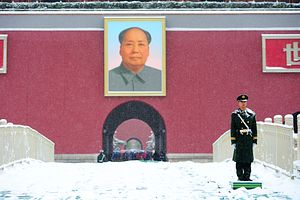A specter is haunting China – the specter of the Cultural Revolution. As China marks the 50th anniversary of this seminal event, its supporters have begun to resurface, raising fears among some of a resurrection of this brutal episode that took or disrupted millions of lives.
Chinese leader Mao Zedong launched the Cultural Revolution in May 1966 as a series of violent political campaigns, aiming to purge his enemies and to establish a Millennium Dynasty centered on his personal cult with absolute power and absolute truth. In the tears-and-blood-shedding decade that followed, the country was turned into a meat grinder, as sanguinary as the Dark Age. The major social experiments during the time were not utopian fantasies but unforgiven crimes. Mao’s demise in September 1976 and the subsequent arrest of his wife and adherents, the “Gang of Four,” finally brought the chaos to an end.
Over the last 40 years, free discussion of the Cultural Revolution has been blocked, although the ruling Communist Party denounced it as “social turbulence” and a “great calamity” in the early 1980s. But as China marked the 50th anniversary of the outbreak of this catastrophe, the sudden spike in rhetoric among Cultural Revolution supporters, known as extreme leftists, has been surprisingly conspicuous.
These extremists paint China under Mao as a paradise, whitewashing the Cultural Revolution’s sins and openly vilifying Deng Xiaoping for his economic reforms and opening up to the outside world. They insist that the rampant corruption China experiences today is a result of capitalist restoration in China, and call for a return to fundamentalist Communism. They challenge the legal basis for the 1980 trial of the Gang of Four, even seeking to canonize Madame Mao, who committed suicide in 1991. This audacity has not been seen since the end of the Cultural Revolution itself. Even though the brutalities of that devastating decade are still a fresh memory for many, their deceitful messages went viral on the Chinese cyberspace. This phenomenon attests to the fact that the ghosts of the Cultural Revolution still linger.
Indeed, attempts to rehabilitate the Cultural Revolution is symbiotic with the revival of Mao worship. In recent years, rapidly spreading Mao worship is a backlash against corruption among ordinary people, who reminisce for a superficially egalitarian Mao time.
For Chinese leaders, the dilemma is that a total rejection of Mao will reject the legitimacy of the Communist rule. But without holding Mao accountable, the Cultural Revolution can never be completely laid to rest. The leftist demagogues pinpointed this Achilles’ heel of the ruling elite, taking advantage of public discontent at social injustice to push for the derailment of reforms and the Open Door policy.
That is why any hint of a comeback of the Cultural Revolution must be blocked. In the past 40 years since Mao’s death, China has been transforming from “revolution distributing poverty” to “legislation redistributing wealth,” in Will Durant’s words. The nightmare outcome is that before this process finishes, widening wealth disparity triggers a new revolution, with or without the word “cultural” in its name, which restarts the entire process again. China’s income inequality is now among the worst in the world, and social tensions are mounting. Given the large number of Mao votaries, especially in rural areas, the so-called Chinese dynastic cycle is not a remote curse but a clear and present threat.
The best way to exorcize the Cultural Revolution is political reform. The tragedies of that period and today’s corruption were caused by the same disease: absolute power. During the Cultural Revolution, absolute power enabled political persecution; today, it allows corrupting officials to steal public treasure.
Today’s China is a society with the social ills of both a developing and a developed country. But it has come too far in terms of social progress in recent decades to turn back now. Keeping nearly 700 million netizens entirely in the dark with the porous Great Firewall is an impossible task. The ruling party ultimately must proceed forward toward the rule of law.
The Chinese leadership can begin political reform by first promoting democracy within the party. While continuing its corruption-busting campaign, it ought to push for increased public oversight of the government, judicial independence, and asset disclosure by officials. These measures, for now, are just rosy dreams, given the obstinacy in party ranks when it comes to reform. But that is the only way to assuage the widespread public indignation, ensuring a peaceful social transformation. Ultimately, only when absolute power is curbed can the heinous ghost of the Cultural Revolution be dispelled once and for all.
Yun Tang is a member of the World Affairs Council of Washington, DC.

































